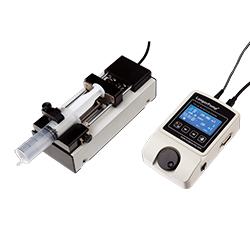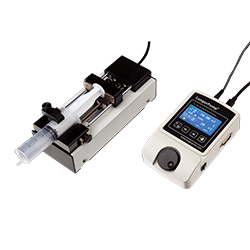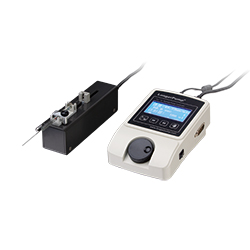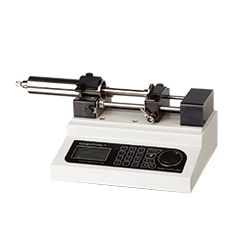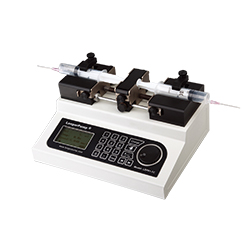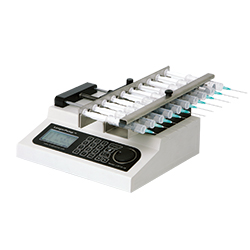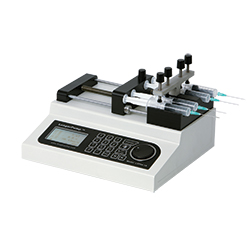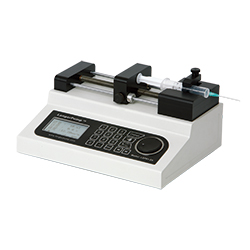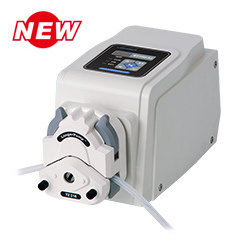Laboratory Syringe Pump in Laboratories
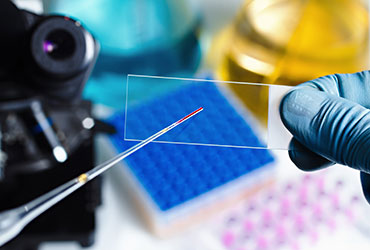
Application Introduction:
A laboratory is a facility that provides controlled conditions for scientific or technological research, where experiments and measurements can be performed. Laboratories can be divided into 3 main categories: 1. Laboratories belonging to schools and universities, and used mainly for experimental teaching and scientific research. 2. Laboratories belonging to national or international agencies, and mainly used for metering, certificating, large research and military projects. 3. Laboratories belonging to companies, and mainly used for product development and research of industrial technologies.
The Customer requirement:
Pumps in laboratories should have a wide range of flow rate, which can be easily controlled in accordance with the experiment’s requirements.
Pumps in laboratories should transfer fluids precisely, thus ensuring the
validity of experimental results and providing valid data for analysis.
A single pump can be used for many different applications
in a laboratory, and there will be no cross-contamination between the different
fluids.
The pumps used in laboratories can be used for the transfer and metering of abrasive
and corrosive fluids.
The pumps should be suitable for shear-sensitive substances, especially for
laboratories where biological substances are used.
The pumps can be interfaced with PCs or other analytical instruments to build
an integrated and efficient laboratory system.
The pumps are very easy to use and maintain.
Longer Pump Solutions:
1. Longer’s Peristaltic Pumps have wide range of flow rate, from 0.002ml/min to 35L/min, this flow rate can be controlled easily, either by the control panel or the remote controller. Repeatable dispensing accuracy is achieved by precise speed control and calibration. The low shear and gentle action ensures that the biological substances are not damaged during pumping. When used in the laboratory, the pumps are very easy to load and extremely versatile. When pumping fluids, the fluids only come into contact with the bore of the tubing, this eliminates contamination risks between the pump and the fluid. By changing the tubing, pumps can transfer different corrosive and abrasive fluids without any cross-contamination.
2. Longer’s Laboratorial Syringe Pumps have an extremely high precision for small volume applications. The range of flow rate is between 0.024nl/min and 124.361ml/min. When transferring fluids, the fluid only comes into contact with the bore of the syringe, thus eliminating the risk of contamination between the pump and the fluid. By changing the syringe, the pump can transfer different corrosive fluids without any cross-contamination.
3. Longer’s Diluter & Dispenser System is a highly precise syringe pump designed to easily dilute and dispense fluids for laboratory applications. The accuracy is better than 99.5%.
4. Longer’s PicoPump (cell injector) is mainly designed for intracellular injection. The repeatable volumes for micro-injections, range from picoliters to nanoliters. The pump is operated by compressed gas, and injects fluids, such as DNA and fluorescent agents into the cells.
Customer Value:
1.High precision fluid transferring ensures the validity of the experiment result and provides valid data for the analysis of the experiment result.
Dispensing precision of peristaltic pump <2%Travel control accuracy of laboratorial syringe pump ≤0.5%
Dispensing precision of diluter &dispenser system ≤0.5%
Pressure control precision of PicoPump ≤0.5%
2.Eliminate the contamination risk during fluid transferring
When the peristaltic pump, laboratorial syringe pump or diluter &dispenser system transfers the fluid, the fluid only contacts the bore of the tubing or syringe to eliminate the contamination risk between pump and fluid. Changing the tubing or syringe for different fluids to eliminate the cross-contamination between different fluids.
3.Reduce the substance damaging and protect the substance integrity for biological substance transferring
The low shear, gentle pumping action of peristaltic pump ensures the substance will not be damaged.
4.Suitable for abrasive liquid with particles or corrosive liquid transferring
Gentle pumping action of Longer peristaltic pump is ideal for the semisolids, heterogeneous mixtures and liquid with particles. When transferring the fluid, the fluid only contacts the bore of the tubing. By using the tubing with good abrasive resistance, the pump can be used to transfer the abrasive liquid. By using the tubing with good chemical resistance, the pump can be used to transfer the corrosive liquid.Soft particle size<25%*ID (tubing inside diameter)
Hard particle size<5%*ID (tubing inside diameter)
5.Remote control capability of the pump enables the more efficient automatic control system of the laboratory.
Longer peristaltic pump and laboratorial syringe pump could be controlled by PC or other instruments through RS485 interface or analog signal interface. And the pumps could also output the status signals to other instruments for the remote control. So the pumps could be integrated into the automatic control system of the laboratory, which will automatically complete the experiment.
6.Easy operation and maintenance of the pump help reduce the cost
Longer peristaltic pump does not need the valves and seals when transferring the fluid, and can run dry without damage.The only consumable material of peristaltic pump is tubing, which can be changed easily.
The only consumable material of laboratorial syringe pump and dilutor & dispenser system is syringe, which also can be changed easily.






